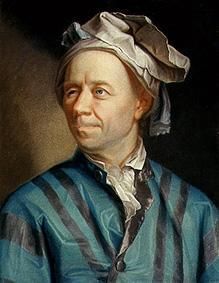Leonhard Euler
Leonhard Euler (April 15, 1707–September 18, 1783) was a devout Christian (Calvinist) who became the greatest mathematician of the eighteenth century and the most prolific of all time. Born in Switzerland to a Calvinist pastor, Euler published 886 papers and his complete works consume about 90 volumes. The St. Petersburg Academy, where Euler worked after been raised in Switzerland and spending some time in Berlin, spent 30 more years after Euler died in continuing to publish his work. Yet much of Euler's work was done when he was completely blind.
Euler accepted the Bible as being divinely inspired, and criticized a competing philosophy for being atheistic. Euler said:[1]
| “ | For since the fabric of the universe is most perfect and the work of a most wise Creator, nothing at all takes place in the universe in which some rule of maximum or minimum does not appear. | ” |
Euler created the most beautiful formula in all of mathematics, Euler's formula, and three of the top five most elegant equations according to a poll of mathematicians. Euler laid a foundation for both complex analysis and combinatorial topology.
In 1736, Euler published a paper which began the field of topology based on a problem called “The Seven Bridges of Königsberg.”
Interestingly, Euler had extraordinary powers of concentration. He could recite the entire Aeneid word-for-word. He could work amid noise and distractions. He could do phenomenal calculations in his head, which became very useful after he went blind in 1766.[2]
Euler is the greatest scientist/mathematician ever from Switzerland.
